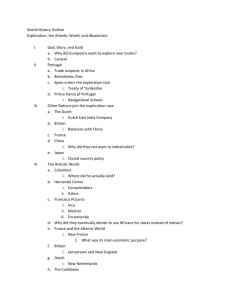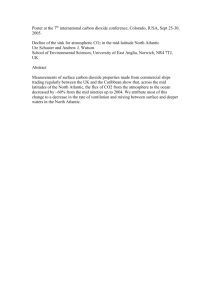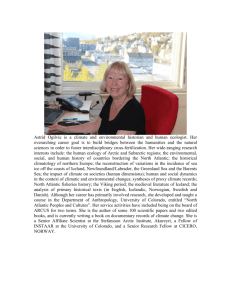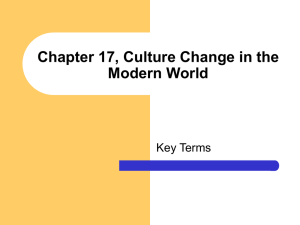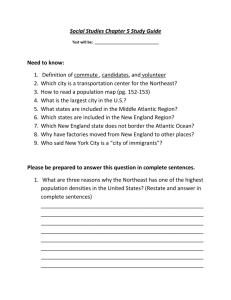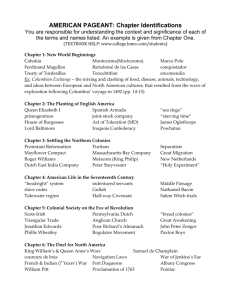NIAS workshop: Beyond Dutch Atlantic Connections Monday 11 March:
advertisement
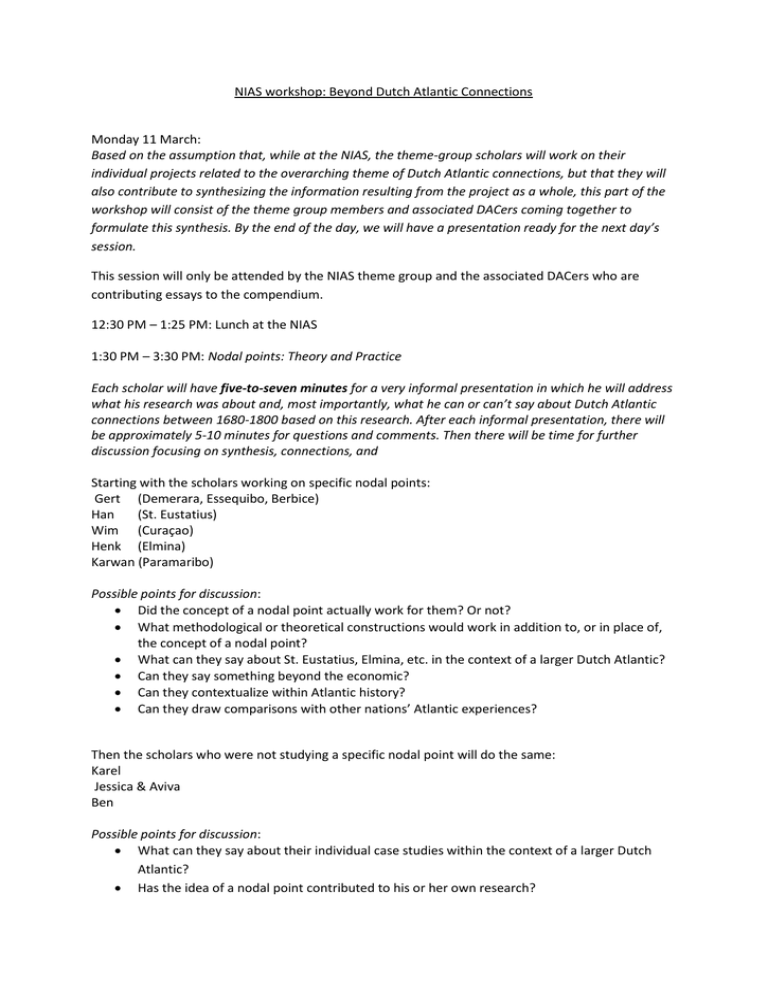
NIAS workshop: Beyond Dutch Atlantic Connections Monday 11 March: Based on the assumption that, while at the NIAS, the theme-group scholars will work on their individual projects related to the overarching theme of Dutch Atlantic connections, but that they will also contribute to synthesizing the information resulting from the project as a whole, this part of the workshop will consist of the theme group members and associated DACers coming together to formulate this synthesis. By the end of the day, we will have a presentation ready for the next day’s session. This session will only be attended by the NIAS theme group and the associated DACers who are contributing essays to the compendium. 12:30 PM – 1:25 PM: Lunch at the NIAS 1:30 PM – 3:30 PM: Nodal points: Theory and Practice Each scholar will have five-to-seven minutes for a very informal presentation in which he will address what his research was about and, most importantly, what he can or can’t say about Dutch Atlantic connections between 1680-1800 based on this research. After each informal presentation, there will be approximately 5-10 minutes for questions and comments. Then there will be time for further discussion focusing on synthesis, connections, and Starting with the scholars working on specific nodal points: Gert (Demerara, Essequibo, Berbice) Han (St. Eustatius) Wim (Curaçao) Henk (Elmina) Karwan (Paramaribo) Possible points for discussion: Did the concept of a nodal point actually work for them? Or not? What methodological or theoretical constructions would work in addition to, or in place of, the concept of a nodal point? What can they say about St. Eustatius, Elmina, etc. in the context of a larger Dutch Atlantic? Can they say something beyond the economic? Can they contextualize within Atlantic history? Can they draw comparisons with other nations’ Atlantic experiences? Then the scholars who were not studying a specific nodal point will do the same: Karel Jessica & Aviva Ben Possible points for discussion: What can they say about their individual case studies within the context of a larger Dutch Atlantic? Has the idea of a nodal point contributed to his or her own research? Is the concept of a nodal point helpful? Can the research be contextualized within Atlantic history? Does the concept of a ‘national’ Atlantic even work, in general? And especially outside the realm of the economic? Short break – 3:30 PM – 3:45 PM 3:45 PM – 5:00 PM: Synthesis, Intersections, and Challenges Gert, Jessica, and Alison will help lead us as we regroup and start synthesizing what we came up with in the earlier session. What can we actually say about Dutch Atlantic Connections? The Dutch in the Atlantic? How do the individual case-studies fit into the larger whole? Is any of this really uniquely Dutch at all? Is the purported importance of the Dutch in the Atlantic as middlemen, brokers, and cultural and economic intermediaries a question of a slight difference in scale from that of other nations, or was there really a qualitative difference? Is there a singular Dutch Atlantic “model?” Tuesday 12 March: We ask that the participants (re)think the relevance of the “Dutch-in-the Atlantic” experience for our understanding of the Dutch experience in Asia and for world history in general. We want to push the boundaries of the research generated by the “Dutch Atlantic Connections” project and look for connections and intersections with the history of (the Dutch in) Asia and will frame the possibilities for the study of global or world history as a whole. This session will be attended by the theme group members, associated DACers who are contributing to the volume, and invited experts. 10:00 AM – 10:30 AM: Gert and Jessica present the synthesis drawn from the session on Monday 10:30-11:30: Alison Games and Piet Emmer reflect on the question where the study of the Dutch in the Atlantic fits in the burgeoning field of Atlantic history as a whole and what, if anything, the DAC project has contributed to that in light of their expertise in the field. One question they may ponder is if Atlantic history is even relevant anymore? 11:30 – 11:45 Break 11:45-1:00 PM: Gerrit Knaap, Chris Nierstrasz, and Alicia Schrikker comment on what the DAC project has to contribute to the study of the Dutch in Asia. Chris Nierstrasz and Gerrit Knaap will pay special attention to the VOC and Henk den Heijer and/or Wim Klooster can then respond from the perspective of the WIC. 1:00 PM – 2:00 PM Lunch 2:00 PM-3:15 PM: Marieke Bloembergen and David Henley will explore what the DAC project may have to contribute to the study of Asian history in general. 3:15- 3:30 PM Break 3:30- 4:15 PM: Karel Davids and Andreas Weber will discuss circuits of knowledge. Karel will describe what the DAC project has said about transatlantic networks of knowledge and Andreas Weber will comment about what this can contribute to the study of networks of knowledge and knowledge transfer in the (Dutch) Asian context. Both Karel and Andreas will then help us think about global networks of knowledge in the early modern period and what intersections can be found between the DAC project and ongoing debates and discussions in the history of science and intellectual history. 4:15 – 5:15 PM: Jos Gommans and Cátia Antunes will talk about what the possibilities are for global history. Possible points for discussion What possibilities are raised by the DAC project’s conclusions and methodologies for global history? Paying attention to what Coclanis terms ‘conjuncto’ history, we will discuss how the results of DAC may or may not work in that context. Does an ‘oceanic’ historical approach such as Atlantic History really work? Or is the history of commodities, including the commodities so prevalent in the Dutch Atlantic (sugar, tobacco, silver) the best approach? What other approaches might work? 5:15 – 6:00 PM – DAC and ongoing projects Most of the participants are either running large-scale projects, part of them, or are actively engaged in trying to get funding for their research projects. Has the DAC project contributed anything to their projects, in general? This contribution could be conceptual, methodological, or logistical/practical. What have Gert, Henk den Heijer, and Karel learned from leading such a project? What lessons could they share with the others? 6:00 PM: Dinner
